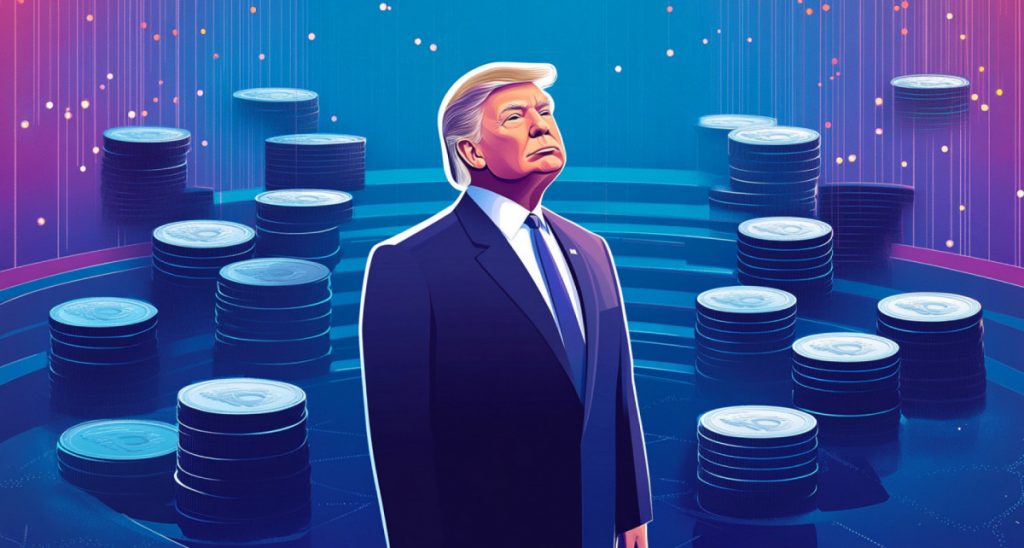Trump’s Bold Move to Make Crypto a National Priority


In Brief
Trump’s executive order making crypto a national priority could significantly alter the cryptocurrency environment in the US, necessitating a thorough examination of its background and driving forces.

An important turning point for the digital asset market has been reached with the news of President-elect Donald Trump’s impending executive order making crypto a national priority. The action, which signals a change from regulatory monitoring to a more cooperative attitude, has the potential to change the course of the cryptocurrency environment in the United States.
This decision’s ramifications, together with the establishment of a crypto advisory council and possible regulations such as a national Bitcoin stockpile, call for a more thorough examination of its background, driving forces, and outcomes.
The Executive Order’s Background
For many years, cryptocurrency has been a divisive issue in American policy circles. Targeting businesses like Binance and Ripple, regulatory bodies like the Securities and Exchange Commission increased enforcement efforts under President Joe Biden. Financial institutions were prohibited from collaborating with cryptocurrency companies, and more than 100 enforcement proceedings were filed, claiming fraud and compliance issues.
With the help of big financial firms like BNY Mellon and BlackRock, the industry grew in spite of these obstacles. The industry’s tenacity and promise are shown by the surge in Bitcoin values to over $100,000 and the growing use of digital assets by traditional companies.
Trump’s direction, which suggests a cooperative structure between the government and cryptocurrency players, may be a game-changer. The administration hopes to capitalize on the potential of the crypto business while promoting innovation and global competition by making it a national priority.
Advisory Council and Strategic Wording
The executive order’s expected language frames cryptocurrencies as a national need. The purpose of this wording is to advise government authorities to work with industry stakeholders instead of taking hostile measures. A key component of this approach is the establishment of a crypto advisory committee. The council, which is made up of professionals from the sector, is anticipated to be crucial in formulating policy and making sure that rules support innovation while addressing any hazards.
Coinbase Vice President for U.S. Policy Kara Calvert emphasized the significance of this strategy. According to her, it warns other countries against lagging behind in the global competition for technical and financial dominance and indicates that the US is prepared to take the lead in the crypto industry.
Proposed Policies and Their Implications
The presidential order’s plan for a national Bitcoin stockpile is among its most contentious features. Currently, the U.S. government owns about $20 billion worth of Bitcoin, mostly via asset seizures. The strategic significance of Bitcoin as a store of value and its function in financial markets are acknowledged by the consolidation of these assets into a national reserve.
Bitcoin’s recent price spike and the stockpiling idea point to a wider acceptance of cryptocurrencies as a respectable financial class. Critics warn about the dangers of volatility and an excessive dependence on a single asset, while supporters contend that such a reserve might act as a hedge against inflation and economic instability.
A moratorium on lawsuits involving crypto organizations is another possible order that is being discussed. In addition to giving the business a break from ongoing enforcement efforts, this halt may enable authorities to review current regulations. This approach may pave the way for fresh development and innovation for businesses like Ripple, which have endured protracted legal disputes.
Industry Influence and Support
These policy initiatives are largely the result of the crypto industry’s strong support for Trump’s government. Businesses like Ripple and Coinbase have supported Trump’s inaugural committee and taken part in occasions like the “Inaugural Crypto Ball.” These initiatives demonstrate the industry’s influence in Washington and its dedication to creating a supportive regulatory environment.
Both industry leaders and aficionados responded favorably to Trump’s campaign pledges to establish the United States as the global center of cryptocurrency. His involvement in a Bitcoin conference and the establishment of projects such as World Liberty Financial indicate a personal stake in the industry’s prosperity.
The ramifications of making cryptocurrencies a national priority extend well beyond the boundaries of the United States. While certain countries are investigating central bank digital currencies (CBDCs), others, like El Salvador, have already accepted Bitcoin as legal money. Trump’s executive order may strengthen America’s standing as a pioneer in the global cryptocurrency market and inspire other countries to follow suit.
This legal change may provide the U.S. crypto industry with a competitive edge that draws in foreign talent and investment. However, it also begs the question of possible geopolitical conflicts, especially as countries look for other ways to implement digital currency.
Innovation and Regulation in Balance
Finding a balance between innovation and regulation is still a difficult task, even if the executive order places a strong emphasis on cooperation. The crypto industry’s detractors contend that inadequate regulation may make problems like fraud, market manipulation, and mining-related environmental concerns worse.
Advocates, however, emphasize how blockchain technology has the ability to change a variety of sectors. The United States can establish itself as a center for technological growth while reducing risks by creating a regulatory framework that encourages responsible innovation.
There will probably be major economic repercussions if cryptocurrencies are made a government priority. Further acceptance and investment may result from increased institutional engagement fueled by a supportive regulatory environment. Major financial institutions, including as BlackRock, have already introduced exchange-traded funds for Bitcoin and Ether, indicating a rise in trust in digital assets.
The current surge in Bitcoin is indicative of excitement over Trump’s crypto plans. The presidential order may spark wider market expansion and establish the United States as a world leader in the cryptocurrency economy if it is successful in establishing a stable and encouraging environment.
Disclaimer
In line with the Trust Project guidelines, please note that the information provided on this page is not intended to be and should not be interpreted as legal, tax, investment, financial, or any other form of advice. It is important to only invest what you can afford to lose and to seek independent financial advice if you have any doubts. For further information, we suggest referring to the terms and conditions as well as the help and support pages provided by the issuer or advertiser. MetaversePost is committed to accurate, unbiased reporting, but market conditions are subject to change without notice.
About The Author
Victoria is a writer on a variety of technology topics including Web3.0, AI and cryptocurrencies. Her extensive experience allows her to write insightful articles for the wider audience.
More articles

Victoria is a writer on a variety of technology topics including Web3.0, AI and cryptocurrencies. Her extensive experience allows her to write insightful articles for the wider audience.


















































